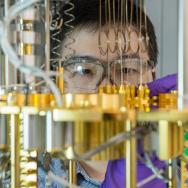For decades, scientists have dreamed about the incredible potential of a supercomputer powered by quantum technology. New partnerships involving the University of Chicago will bring together global leaders in education and technology to enable the next generation of high-performance quantum computing, fueling an industry with the potential to transform computing, information networks and more.
On May 21, alongside world leaders at the G7 Summit in Japan, the University of Chicago formalized groundbreaking agreements with industry and university partners to transform the future of quantum technology. The first is a 10-year, $100 million plan with IBM, the University of Chicago and the University of Tokyo to develop the blueprints for building a quantum-centric supercomputer powered by 100,000 qubits. The second is a strategic partnership between the University of Chicago, the University of Tokyo and Google, with Google investing up to $50 million over 10 years, to accelerate the development of a fault-tolerant quantum computer and to help train the quantum workforce of the future.
“Quantum-centric supercomputing taps modular architectures and quantum communication, and is how IBM plans to scale quantum computing,” said Jay Gambetta, IBM fellow and vice president of IBM Quantum. “Through our landmark partnerships with the University of Chicago and University of Tokyo, we will advance all aspects of quantum architecture and the integration of quantum and classical workflows. This includes hybrid cloud middleware for quantum, as well as error-resilience approaches such as quantum error mitigation and error correction. Ultimately this will enable us to tackle some of the most challenging problems we face as a global society.”
“Building a quantum computer is an ambitious undertaking that requires partnership,” said Hartmut Neven, vice president of Google Quantum AI. “We look forward to working with the University of Chicago and the University of Tokyo to advance the field.”
Quantum-centric supercomputing is an entirely new and promising area of high-performance computing. IBM’s partnership with the University of Chicago and the University of Tokyo will work toward the delivery of a 100,000-qubit system by 2033, which could serve as a foundation to address some of the world’s most complex problems. For example, such a powerful quantum system could unlock the potential to bring tangible benefits to the lives of many—from identifying molecules for new medicines to designing more efficient sustainable solutions for energy.
In partnership with UChicago, the University of Tokyo and its broader global ecosystem, IBM will work over the next decade to advance the underlying technologies of such a system, as well as to design and build the necessary system components at scale.
In tandem, the collaboration between UChicago and the University of Tokyo with Google will help to ensure that quantum computing is developed safely and responsibly, and that the benefits of this technology are shared by everyone.
“Achieving breakthroughs at scale in quantum technology requires deeply rooted and productive collaboration around the world and across a broad range of industry, academic and government partners,” said Paul Alivisatos, president of the University of Chicago. “Quantum information science and technology is at a crossroad, where foundational discovery and technical innovation will combine to create real breakthroughs. The University of Chicago is thrilled to partner in this endeavor.”
“Building a massive quantum-centric supercomputer on the time scale envisaged by our partnerships represents an extraordinary grand challenge—not only for our institutions and our nations, but also for humanity,” said Juan de Pablo, UChicago’s executive vice president for science, innovation, national laboratories and global initiatives. “The necessary blueprints and the underlying technologies don’t yet exist but, in collaboration with our regional and global partners, the University of Chicago is uniquely positioned to help such a machine become a reality.”
The University of Chicago and IBM hope to expand the partnership to include Argonne National Laboratory and Fermilab National Accelerator Laboratory—both of which are members of the Chicago Quantum Exchange and home to two Department of Energy (DOE) quantum hubs. The two laboratories offer unique capabilities and expertise that will be needed to deliver the technologies envisioned in the quest to build a quantum-centric supercomputer.
Collaborations to enable science at scale
The new partnerships will build upon the Chicago area’s strengths in quantum science and engineering. The University of Chicago transformed the region’s quantum ecosystem more than a decade ago with the decision to make quantum technology a focus of the Pritzker School of Molecular Engineering. PME continues to attract new faculty talent to UChicago in quantum science and technology, and Chicago has since become a leading global hub for research in quantum technology and home to one of the largest quantum networks in the country.
“Through these partnerships, we will develop the research and engineering environment necessary to advance quantum science discoveries and build the workforce of the future,” said David Awschalom, the Liew Family Professor in Molecular Engineering and Physics at UChicago and founding director of the Chicago Quantum Exchange. “It is only with international and industrial collaborations like these that we’ll accelerate the pace of quantum technologies and their translation to society.”
Qubits are the basic units of information in quantum computing, similar to the role of bits in classical computing. The distinctive properties of computing via quantum mechanics, alongside both classical and AI computing resources, might allow a 100,000-qubit quantum computer to tackle many complex problems extremely quickly.
IBM will work with its university partners and worldwide quantum ecosystem over the next decade to design a blueprint that will evolve how IBM’s increasingly powerful quantum processors can be connected with both quantum and classical resources. That work will enable system components to be reliable, flexible and affordable, which will ultimately allow scaling to 100,000 qubits.
The University of Chicago leads efforts at the intersection of computer science, materials science and physics that have important implications for physics-informed software design. As quantum computers are scaled and interconnected with classical computing systems, the design of efficient software has the potential to significantly accelerate the performance and reliability of the new machines, shaving years off development time.
“We welcome the opportunity to work with our global partners to realize the vision of developing a quantum-centric supercomputer,” said Fred Chong, the Seymour Goodman Professor in the Department of Computer Science at UChicago. “With researchers who are defining new quantum disciplines and working across fields, the University of Chicago brings a unique research capability to bear on advancing this technology.”
Advancing quantum research and training
The University of Chicago is the headquarters of the Chicago Quantum Exchange, and it is home to the world-renowned Polsky Center for Entrepreneurship and Innovation. Duality, the first startup accelerator program in the U.S. exclusively focused on supporting early-stage quantum companies, was launched by the Polsky Center and the CQE in 2021. Since its inception, it has steered a wide range of companies, many of which have chosen Chicago as their home.
The CQE convenes university, government and industry partners to advance the science and engineering of quantum information, train the next generation of quantum scientists and engineers, and build the quantum economy. Scientists from the CQE, which includes Argonne National Laboratory and Fermilab National Accelerator Laboratory, four universities, and more than 40 industry partners, as well as researchers at other world-class academic institutions in the region, will continue to expand the understanding and utilization of quantum technology.
Through its partnership with the University of Chicago and the University of Tokyo, Google will invest in critical research topics to accelerate the development of a fault-tolerant quantum computer, support the development and exchange of researchers and ideas, promote quantum computing entrepreneurship and business, and develop the workforce needed for the next generation.
Google will make its world-class advanced quantum processors—with up to 72-superconducting qubits and error rates of 0.0001 and 0.003 for 1-qubit and 2-qubit gates respectively—available to researchers from the University of Chicago and University of Tokyo. It also will expand access to classical computing for researchers, helping university students and faculty to learn how to program and develop algorithms for quantum computers.
To promote research breakthroughs, Google will invest in faculty grants to focus on research areas, and it will also fund graduate and undergraduate research at universities across the world to encourage these future leaders’ promising projects. This new partnership will provide opportunities for startups from the greater Chicago and Tokyo areas and help train hundreds of students and build a pipeline of talent in electronics, chip fabrication, software engineering and more.
—Includes previously published content from IBM and Google. Read the IBM story here. Read the Google blog here.

